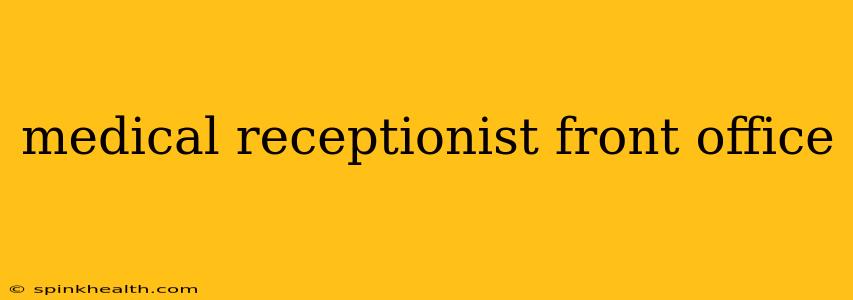The comforting aroma of coffee hangs in the air as Sarah, a seasoned medical receptionist, arrives at the bustling clinic. The day hasn't even begun, but the energy is already palpable. Her role is more than just answering phones – it's the vital heartbeat of the front office, ensuring the smooth operation of this healthcare hub. This isn't just a job; it's a career built on compassion, organization, and a genuine desire to help people.
What Does a Medical Receptionist Do?
Sarah's day begins with a quick check of the schedule – appointments, cancellations, and any urgent requests from the doctors. She meticulously updates patient records, ensuring accuracy and privacy compliance. Then the phones start ringing – a symphony of inquiries, appointment requests, and urgent messages. Each call requires a calm, professional demeanor, efficiently directing calls and scheduling appointments with precision. She's a master multitasker, expertly juggling phone calls, greeting patients with warm smiles, and managing the flow of paperwork. She's the first point of contact, the calming presence that sets the tone for a patient's entire clinic visit.
What Skills Do You Need to Be a Medical Receptionist?
Beyond the warm smile and friendly demeanor, Sarah possesses a powerful skillset. Her typing speed is phenomenal, her organizational skills are legendary, and her knowledge of medical terminology is impressive. She expertly handles insurance claims, codes medical procedures, and maintains strict confidentiality. These skills aren't just learned; they're honed through experience and a dedication to continuous learning. She understands the intricacies of healthcare systems and navigates them with expertise. Moreover, her empathy and communication skills are invaluable; she's adept at handling stressed or anxious patients, ensuring they feel heard and understood.
What are the Daily Tasks of a Medical Receptionist?
Patient Check-in and Check-out: This is the bread and butter of Sarah's day. She greets each patient, verifies their insurance information, collects co-pays, and ensures a smooth transition throughout their visit. This includes providing clear instructions, answering questions, and addressing any concerns.
Scheduling Appointments: Mastering the art of appointment scheduling requires precision and organization. Sarah uses advanced scheduling software to efficiently manage appointments, minimize wait times, and ensure the clinic runs smoothly. She’s also adept at rescheduling and managing cancellations.
Managing Patient Records: Maintaining accurate and up-to-date patient records is crucial. Sarah diligently updates records, ensuring privacy and compliance with HIPAA regulations. This meticulous record-keeping is vital for the clinic's efficiency and patient care.
Handling Insurance Claims: Sarah's expertise extends to navigating the complexities of insurance claims. She understands different insurance policies, codes medical procedures correctly, and follows up on claims to ensure timely payments.
Answering Phones and Directing Calls: The phone is Sarah's lifeline, connecting her to patients, other healthcare professionals, and the outside world. She answers calls professionally, efficiently directs them to the appropriate person, and takes accurate messages.
How Much Does a Medical Receptionist Make?
The salary of a medical receptionist varies depending on location, experience, and the size of the practice. However, it's a rewarding career with a growing demand, offering a good balance of responsibility and opportunity for advancement.
Is it Hard to Become a Medical Receptionist?
Becoming a medical receptionist is accessible to many. While formal training or certification can be beneficial, many employers value experience and a strong work ethic. The focus is on the ability to learn quickly, adapt to a fast-paced environment, and maintain composure under pressure.
What is the Job Outlook for Medical Receptionists?
The demand for skilled medical receptionists is projected to grow steadily in the coming years, reflecting the continuous expansion of the healthcare industry. It's a stable and rewarding career path with opportunities for growth and advancement within the field.
Sarah finishes her day with a sense of accomplishment. She knows that her role, while seemingly small, is an integral part of providing quality healthcare. She's not just a receptionist; she's a key member of the team, a vital link in the chain of care, and the friendly face that welcomes patients into a healing environment. It's a job filled with challenges, but the rewards are immeasurable.

